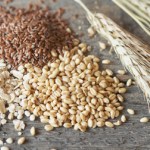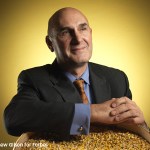organic farming
The number of people on Earth is expected to shoot up from the current 6.7 billion to 9.2 billion by 2050. How will we feed them? If we continue with current farming practices, vast amounts of wilderness will be lost, millions of birds and billions of insects will die, and farm workers will be exposed to more and more chemicals. And still, we will not have enough food. Clearly, there must be a better way.
Some scientists and policymakers suggest that genetic engineering, a modern form of crop modification, will dramatically reduce our dependence on pesticides, enhance the health of our…
There is little doubt that organic farmers have been instrumental in bringing the need for ecologically based agriculture to the public's attention. That is a good start. We now need to move beyond organic (still only ca 2% of US agriculture) and embrace other tools and farming practices that can help shift current agricultural systems towards enhanced sustainability.
The need is dire.
1 billion people are malnourished, 300,000 people continue to die each year from pesticide-related poisonings, farming on ecologically sensitive land is expanding, the water needed to sustain farming dwindles…
A few years ago, next to a small barn converted into a winery, I noticed a flyer asking voters to support Measure M, an initiative in Sonoma county that sought to " prohibit the raising, growing, propagation, cultivation, sale, or distribution of most genetically engineered organisms."
It pictured the destruction in New Orleans wrought by Hurricane Katrina and the bewildered gaze of George W. Bush. The flyer proclaimed "Who do you trust with your family's health and safety? When FEMA failed, more than a million Americans suffered."
That flyer was typical of the misinformation about GE crops,…
Tomorrow's Table's Swiss-Gruyere pie made it to the pi day Pie Bake off finals.
If you have time to peruse the entries, please do. Vote here.
For the 2010 Pi day bakeoff, I baked a Swiss chard-Gruyere pie.
Shown here is the backdrop to our garden:a mural on the side of our barn, painted with California poppies, rice plants, sunflowers and (look closely) a red double helix. Artist: Jim McCall, Elastic Media.
Here is the recipe:
First, gather as many ingredients as you can from your garden. In our garden, I found multi-colored swiss chard, Kale, chives, thyme and parsley.
Next, prepare the crust:
1 cup barley flour2 cups white flour
1 tsp salt
1 cup unsalted butter
1/2 cup unsalted margarine, frozen
grated rind of 1…
Thank you Bill Gates for your work on behalf of farmers and.... for blogging on our book, Tomorrow's Table!
If you don't have time to read the full reviews, here are a few excerpts:
"This is an important book for anyone who wants to learn about the science of seeds and the challenges faced by farmers... I think anyone who reads this book will be convinced of the authors' sincerity and intelligence - even if, like me, you never try any of the cool-sounding recipes...
I gained an understanding of the history of organic farming and learned about some of the very clever ways organic farmers…
Read Emily Waltz' interview with Roger Beachy, the new director for the National Institute of Food and Agriculture (NIFA), the new research funding arm of the US Department of Agriculture (USDA).
What does Beachy's appoinment mean for researchers, farmers and consumers?
Larger, longer grants with more money for education or extension, so the knowledge can reach from the lab to the food to the fork; a stonger focus on sustinable approaches; and a regulatory stucture that is science based
We need to build enhanced capacity in the US to address urgent agricultural challenges such as sustainable…
Last year, I attended a Food Symposium at the Mountainfilm festival in Telluride.
Many of the speakers offered a simple solution to feeding the world in the face of a population that is expected to grow to 9.2 billion by the year 2050: Eat local.
But how much impact will the "locavore" movement really have on sustainable food production?
Not much, says James McWIlliams in his latest book "Just Food". "Eating local is not, in and of itself, a viable answer to sustainable food production on a global level."
"We should not delude ourselves into thinking that the relatively easy decision to…
In an interview with The Times, Gordon Conway, Professor of International Development at Imperial College London and a former government adviser said that the ban on organic farmers using GM crops was based on an excessively rigid rejection of synthetic approaches to farming and a misconception that natural ways were safer and more environment- friendly than man-made ones.
I completely agree with Gordon Conway that it makes sense for farmers to use the most powerful tools available to make their production more sustainable. Still, I think it unlikely in the short term that organic farmers…
Here is another interesting story about Monsanto, in Forbes magazine. The article manages to avoid calling Monsanto all good or all bad and instead looks at what Monsanto means for the future productivity of the global food supply.
One of the pleasures of reading Stewart Brand's new book, "Whole Earth Discipline", is that when it comes to managing the Earth's ecosystem, he is unconstrained by conventional wisdom.
In a break with many old-school environmentalists, Brand argues that the established Green agenda is outdated, too negative, too tradition bound, too specialized, too politically one-sided to address the scale of environmental problems that we face today.
Who better to challenge the rigidity of the long-respected environmental movement than the distinguished writer, lecturer and author of the classic Whole…
An article in the Harvard International Review by Paul Collier paints a stark view of African peasantry. Collier presents a convincing argument that for African agriculture to become more productive, it needs modern agricultural technologies and new modes of organization
(Thanks to Eric Ward for alerting me to this article).
"The poverty of African peasants is not accidental: it is intrinsic to the peasant mode of economic organization. The very features that make the peasant mode of production appear attractive to jaded members of an industrialized society also make it unproductive. Large…
Kent J. Bradford, Professor of Plant Sciences and Academic Director of the Seed Biotechnology Center at UC Davis, is today's guest blogger.
Ever since our ancestors adopted an agricultural lifestyle about 10,000 years ago, our own sustainability has been intimately tied with that of our food production systems. Those systems currently support 6.7 billion humans, or more correctly, adequately support about 5.9 billion with another 800 million or so suffering from food insecurity, malnutrition or hunger. Compare that with the 1960's when the world population was 3 billion, with 1 billion…





